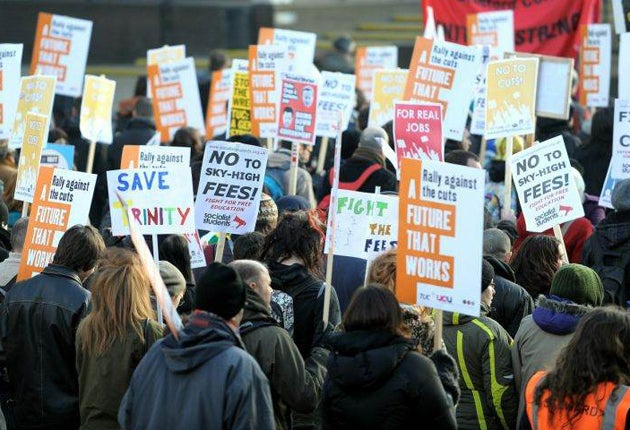£6,000 help for poorer students as Clegg hopes to appease critics

Bright students from poor families will receive £6,000 a year towards university tuition fees of up to £9,000 under a plan to be announced by the Government today.
Universities in England that want to charge more than £6,000 in fees from next year will have to fund a national scholarship programme in return. The scheme will be worth £150m annually by 2014-15, when 48,000 students from families with an income of less than £25,000 a year will be helped. At present, about one-third of the 340,000 undergraduates are in this income group but are less likely to go to the elite universities than those from better-off households.
The Government will contribute £3,000 towards their annual fees and the university a further £3,000 in matching funding, leaving the student to repay the remaining amount of up to £3,000 after their income from working reached £21,000 a year. It could mean poor students paying less than the current £3,290 a year flat-rate fee.
The new subsidies to students from disadvantaged backgrounds could take the form of: a "free" foundation year; cheap accommodation; a £1,000-a-year bursary; a fee waiver or discount; or a combination of these.
New rules for universities that want to charge more than £6,000 a year will be spelt out in a letter from Vince Cable, the Business Secretary, and David Willetts, the Universities Minister. Universities will have to reach a deal with the Office of Fair Access to greatly improve their performance in attracting a wider mix of students, but will be free to decide how they achieve that.
In practice, it is likely to mean admitting young people from disadvantaged homes with lower A-levels at the expense of some who get higher grades. Ministers are braced for a backlash from parents who have sent their children to private schools in the hope of guarantee a university place.
Ministers insist they are not "lowering the bar," saying universities will be trusted to maintain their academic standards. Nick Clegg, the Deputy Prime Minister, will deny today that the policy amounts to "social engineering", saying: "It is about creating a genuinely fair playing field for all our young people."
After the Liberal Democrats' dramatic U-turn on fees last year, Mr Clegg will admit the drive to widen access will have failed unless more young people from poor families go to university by the next general election, saying: "Universities should be a powerful agent of social mobility in this country but too often instead they are reinforcing social divisions. There is a social crisis in this country – a crisis of opportunity. Social mobility will improve only if we throw open the doors of universities, especially the most selective, to bright students from disadvantaged backgrounds."
Every university in England will have to charge more than the £6,000 minimum tuition fee proposed by the Government, according to research published today by the University and College Union. It shows the average fee would have to be £6, 863 a year to make up for the cuts to teaching budgets planned by ministers. Oxford and Cambridge are to charge the maximum of £9,000 a year for all their courses and expect many more to follow.
Sally Hunt, general secretary of the UCU, said: "Government claims that universities will only charge more than £6,000 a year in exceptional circumstances are completely bogus."
Join our commenting forum
Join thought-provoking conversations, follow other Independent readers and see their replies
Comments
Bookmark popover
Removed from bookmarks